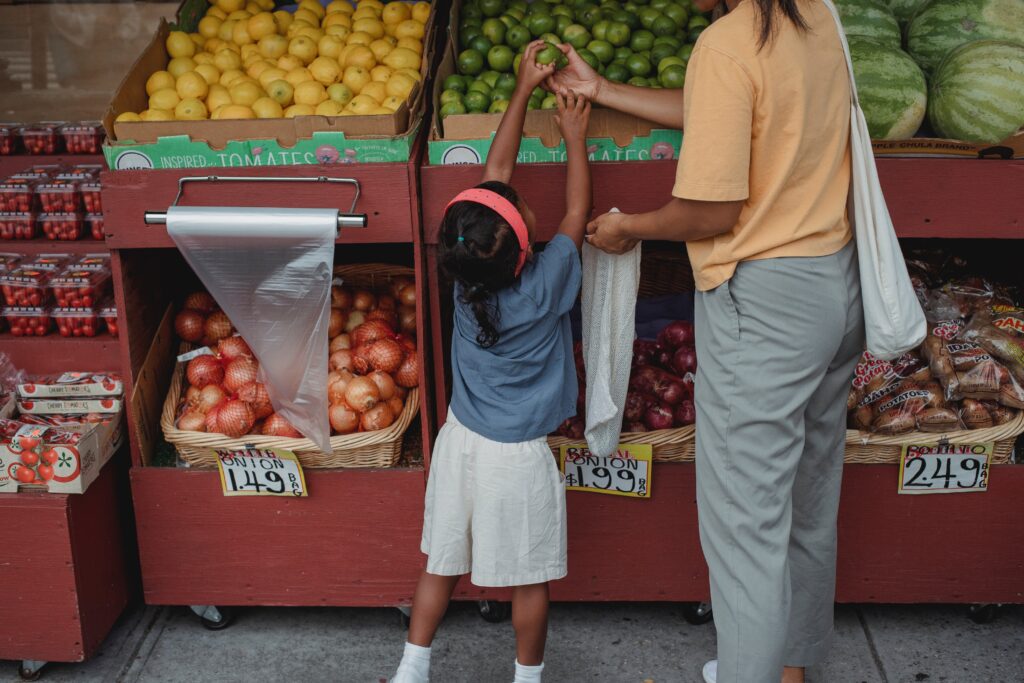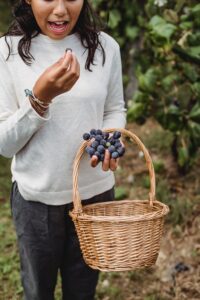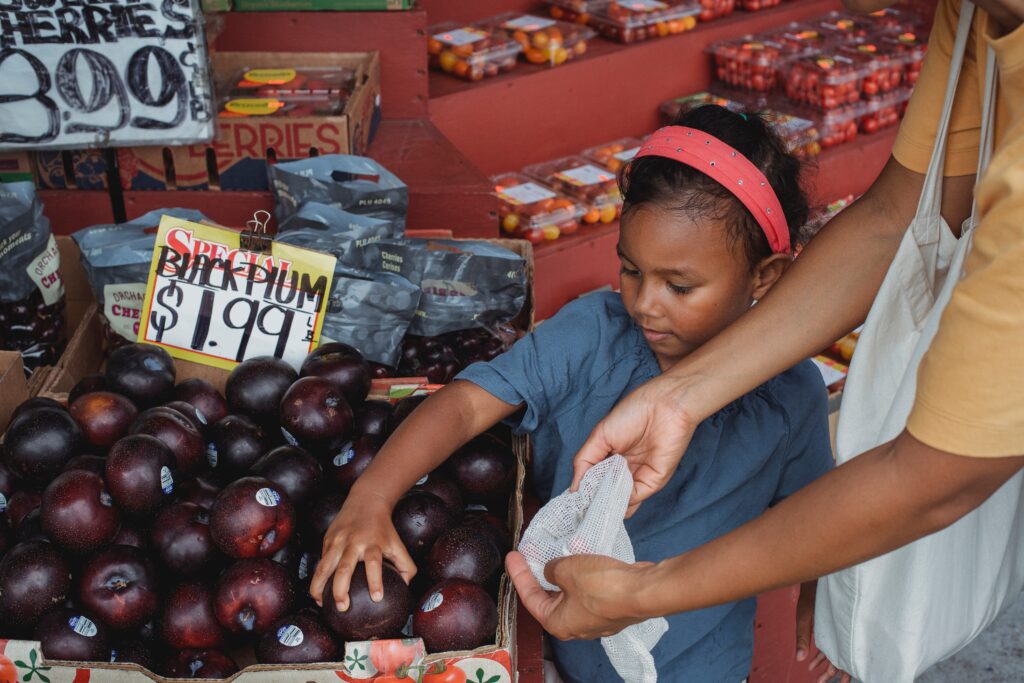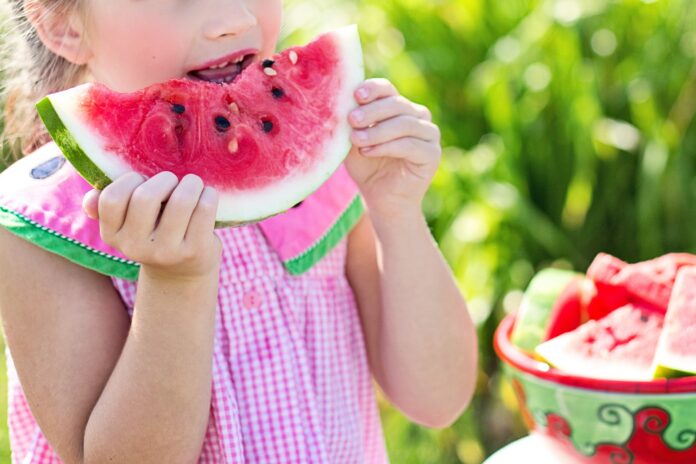Fruit stand near me – Learn more with Healthier Baby Today! Farmer’s markets are a hub for fresh produce and local goods and an incredible learning opportunity for all children.
Whether they attend field trips with their schools or tag along with their families and friends, these vibrant markets offer a range of benefits for young learners.
Table of Contents
1. Broaden Their Vocabulary

One of the notable advantages of visiting farmer’s markets or a fruit stand near me is the opportunity for children to broaden their vocabulary.
With an array of fruits, vegetables, and homemade products on display, youngsters are exposed to a variety of new words and terms.
Discover the wonders of different types of produce and their growth and gain knowledge of unique commerce terms.
As parents and educators guide them through the market, children absorb this newfound knowledge, expanding their vocabulary and building a stronger foundation for language development.
2. Social and Emotional Benefits

Moreover, attending a farmer’s market or fruit stand near me can have remarkable social and emotional benefits for kids.
These markets provide an ideal setting for children of all ages to engage with others in their community.
They can interact with farmers, artisans, and fellow visitors, fostering social skills such as communication, sharing, and cooperation.
This social interaction helps children develop a sense of belonging and community, enhancing their emotional well-being.
3. Practical Platform for Introducing Basic Math Skills
Farmer’s markets and a fruit stand near me can also serve as a practical platform for introducing basic math skills. Children can learn about counting, sorting, and measuring as they observe the quantities and prices of different items.
Engaging them in conversations about the cost of fruits or the quantity of eggs helps them grasp fundamental mathematical concepts in a real-world context.
By immersing themselves in the market’s bustling atmosphere, young learners develop a practical understanding of mathematical concepts beyond a classroom’s confines.
4. Valuable Classification Skills

In addition to the numerous benefits mentioned earlier, attending a farmer’s market can also foster valuable classification skills in children.
Visiting these markets can provide an excellent opportunity for young learners to delve deeper into the world of food and better understand the importance of different food groups.
They can learn about the benefits of fruits, vegetables, and grains and explore the various types and varieties available.
By interacting with vendors and seeing how these foods can be prepared and consumed, young learners can develop a greater appreciation for healthy eating habits.
Additionally, they can learn about the cultural significance of certain foods and how they are used in traditional dishes.
These markets offer a fun and educational experience for young learners interested in food and nutrition.
As children wander through the market stalls, they can observe and identify the characteristics distinguishing fruits from vegetables and grains.
Exploring these distinctions at the fruit stand near me or farmer’s market allows children to visually examine and compare the various produce on display, building their classification skills.
5. Different Food Groups

Engaging children in discussions about the different food groups and their nutritional benefits further enhances their understanding.
By actively participating in these discussions, children begin to develop an awareness of the nutritional value of different foods and the importance of a well-balanced diet.
Exploring these grain-based products and understanding their source, like wheat or oats, adds another layer to a child’s understanding of food classification.
They can discover the importance of grains as a significant energy source and learn how they are processed and consumed.
Children acquire valuable classification skills by immersing themselves in the diverse world of produce and goods at the fruit stand near me and farmer’s market.
They learn to differentiate between fruits, vegetables, and grains, understand their nutritional properties, and develop an appreciation for the variety of available food options.
As they continue to explore and engage in these learning experiences, their understanding of food classification becomes more refined, paving the way for a lifelong appreciation of healthy eating habits.
6. Improve Imaginary Skills
Inspired by their experiences at a fruit stand near me or farmer’s market, children can even create their own mini-markets within their schools.
They can utilize their imagination or, if feasible, grow fruits and vegetables in their playground or classroom gardens.
This hands-on approach allows children to take on roles as farmers, vendors, and customers, promoting creativity, cooperation, and problem-solving skills.
Through this imaginative play, they develop a deeper understanding of the market environment and gain a sense of pride in their own accomplishments.
To extend the learning experience beyond the farmer’s market or a fruit stand near me visit, young learners can engage in enriching activities that reinforce their understanding of different food groups.
Reading picture books highlighting fruits, vegetables, and grains can deepen their knowledge and spark their imagination.
Children can explore the characteristics, benefits, and cultural significance of various foods through engaging stories and vibrant illustrations.
7. Art Activities

Art activities centered around food can also be incorporated into the learning process. Preschoolers can create colorful collages using pictures of fruits and vegetables, allowing them to express their creativity while reinforcing their understanding of different food groups.
They can also participate in sensory activities, such as vegetable stamping or fruit painting, where they use the natural shapes and textures of produce to create unique artwork.
Furthermore, purchasing items at the farmer’s market or fruit stand near me opens up opportunities for hands-on cooking or baking experiences in the classroom.
For instance, if apples are bought, children can engage in a group activity of peeling, slicing, and cooking the apples to make a delicious apple pie.
This activity enhances their understanding of the fruit category and introduces them to basic cooking skills, following instructions, and working together as a team.
Such activities foster a deeper connection to the food they consume and empower children to appreciate the process of preparing meals.
These extensions to the farmer’s market experience enhance their overall learning journey and create memorable, multi-sensory experiences that connect them to the world of food in meaningful ways.
Important Facts as Why a “Fruit Stand Near Me” Can Benefit Children…
Farmer’s markets offer children an enriching educational experience that goes beyond simply purchasing fresh produce.
These markets serve as dynamic learning environments where children can expand their vocabulary, develop social skills, learn basic math concepts, and even recreate the experience in their own school settings.
So, next time the opportunity arises, take your little ones to a farmer’s market and witness the incredible growth and learning that can unfold in these vibrant spaces.




